Clinical characteristics and level of anxiety in patients with heart failure depending of social and household stressogenic factors associated with martial law
Main Article Content
Abstract
The aim – to study the impact of potential stressogenic factors associated with martial law on basic clinical and instrumental parameters and the severity of anxiety symptoms in patients with chronic heart failure (CHF).
Materials and methods. 200 patients with CHF of NYHA II-IV functional classes were examined, which had treatment at the cardiological department. The diagnosis of heart failure was determined according to the recommendations of the European Society of Cardiology in 2021 with the involvement of indicators of general clinical examination, electrocardiography, echocardiography, and laboratory tests. Patients were given a standardized survey of two questionnaires, namely, the original General Burden of Martial Law questionnaire and the standard HADS anxiety/depression questionnaire.
Results and discussion. The high level of anxiety, which corresponded to clinically significant (≥ 11 points on the HADS scale) in those patients who were exposed to various potentially stressful influences (internally displaced persons, separation from family, absence of medical care and/or medicines). The period of long-term absence of medical care was also associated with a statistically significantly higher level of C-reactive protein and a statistically significantly lower relative number of lymphocytes in the blood compared to other patients. Patients without medicines had a higher level of anxiety and a lower (at the limit of statistical significance) relative number of lymphocytes in the blood. The original ABVS scale can use in patients with psychological problems. The main clinical and instrumental indicators of patients was not depended of potentially stressful factors.
Conclusions. Internally displaced persons with CHF had a statistically significantly higher sum of points of War Impact Questionnaire (ABVS) compared to other patients with CHF (p<0.0001). Patients from a combat zone, as well as patients who were separated from their relatives for a long time, had a high level of anxiety compared to other patients. Patients with CHF without medical care were characterized by a high level of anxiety (12.0 points on the HADS scale against 8.0 in other patients, p=0.008), a statistically significantly higher level of C-reactive protein ((13.4±10.10) vs (8.6±11.6) mg/ml in other patients, p=0.03) and a lower relative content of lymphocytes in peripheral blood compared to other patients ((17.8±6.6) versus (21.0± 7.9), p=0.03).
Article Details
Keywords:
References
Störk S, Handrock R, Jacob J, Walker J, Calado F, Lahoz R, Hupfer S, Klebs S. Epidemiology of heart failure in Germany: a retrospective database study. Clin Res Cardiol. 2017 Nov;106(11):913-22. https://doi.org/10.1007/s00392-017-1137-7.
Celano CM, Daunis DJ, Lokko HN, Campbell KA, Huffman JC. Anxiety disorders and cardiovascular disease. Curr Psychiatry Rep. 2016 Nov;18(11):101. https://doi.org/10.1007/s11920-016-0739-5.
Easton K, Coventry P, Lovell K, Carter LA, Deaton C. Prevalence and measurement of anxiety in samples of patients with heart failure: meta-analysis. J Cardiovasc Nurs. 2016 Jul-Aug;31(4):367-79. https://doi.org/10.1097/JCN.0000000000000265.
Gerritsen J, Dekker JM, Ten Voorde BJ, Kostense PJ, Heine RJ, Bouter LM, Heethaar RM, Stehouwer CD. Impaired autonomic function is associated with increased mortality, especially in subjects with diabetes, hypertension, or a history of cardiovascular diseases: the Hoorn Study. Diabetes Care. 2001 Oct;24(10):1793-8. https://doi.org/10.2337/diacare.24.10.1793.
Kawachi I, Sparrow D, Vokonas PS, Weiss ST. Decreased heart rate variability in men with phobic anxiety (data from the Normative Aging Study). Am J Cardiol. 1995 May 1;75(14):882-5. https://doi.org/10.1016/s0002-9149(99)80680-8.
Bankier B, Barajas J, Martinez-Rumayor A, Januzzi JL. Association between C-reactive protein and generalized anxiety disorder in stable coronary heart disease patients. Eur Heart J. 2008 Sep;29(18):2212-7. https://doi.org/10.1093/eurheartj/ehn326.
Mercer DA, Lavoie KL, Ditto B, Pelletier R, Campbell T, Arsenault A, Bacon SL. The interaction between anxietyand depressive symptoms on brachial artery reactivity in cardiac patients. Biol Psychol. 2014 Oct;102:44-50. https://doi.org/10.1016/j.biopsycho.2014.07.012.
Kornatsʹkyy V.M. [Problema zdorovʺya v umovakh viyny. Stres i sertsevo-sudynni zakhvoryuvannya v umovakh voyennoho stanu]. Kyyiv, 2022. s. 5-23. Ukrainian.
McDonagh TA, Metra M, Adamo M,et al. ESC Guidelines for the diagnosis and treatment of acute and chronic heart failure. Developed by the Task Force for the diagnosis and treatment of acute and chronic heart failure of the ESC with the special contribution of the Heart Failure Association of the ESC. Eur Heart J. 2021 Sep 21;42(36):3599-726. https://doi.org/10.1093/eurheartj/ehab368.
Friedmann E, Thomas SA, Liu F, Morton PG, Chapa D, Gottlieb SS; Sudden Cardiac Death in Heart Failure Trial Investigators. Relationship of depression, anxiety, and social isolation to chronic heart failure outpatient mortality. Am Heart J. 2006 Nov;152(5):940.e1-8. https://doi.org/10.1016/j.ahj.2006.05.009.
Wei Jiang, Maragatha Kuchibhatla, Cuffe MS, Christopher EJ, Alexander JD, Clary GL, Blazing MA, Gaulden LH, Califf RM, Krishnan RR, O’Connor CM. Prognostic Value of Anxiety and Depression in Patients With Chronic Heart Failure. Circulation.2004Nov4;110(22):3452-6. https://doi.org/10.1161/01.CIR.0000148138.25157.F9


